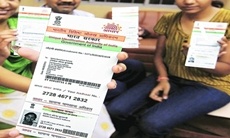Aadhaar depriving countless Indians of access to services: Amnesty, HRW
15 Jan 2018
There is a growing body of evidence that the government's relentless push to make Aadhaar identification mandatory for everything from mobile telephony to railway tickets may be leading to millions of Indians being denied access to essential services and benefits in violation of their basic human rights.
 Amnesty International India and Human Rights Watch said on Saturday that apart from denial of benefits to those without Aadhaar, the large-scale collection of personal and biometric data and linking it to a range of services also raises serious concerns about violations of the right to privacy.
Amnesty International India and Human Rights Watch said on Saturday that apart from denial of benefits to those without Aadhaar, the large-scale collection of personal and biometric data and linking it to a range of services also raises serious concerns about violations of the right to privacy.
The government should order an independent investigation of the concerns raised about Aadhaar, and cease targeting journalists and researchers who expose vulnerabilities in security, privacy, and protection of data, the organisations said in a press release.
''The government has a legal and moral obligation to ensure that nobody is denied their rights simply because they don't have an Aadhaar card,'' said Aakar Patel, executive director at Amnesty International India, as reported by The Tribune.
The Aadhaar Act of 2016 was meant to be limited in scope, to facilitate the direct transfer of benefits to the needy. But subsequent notifications and licensing agreements dramatically increased the scope of the project, making Aadhaar enrolment mandatory for people to access a range of essential services.
Several reports have emerged of late of shops providing subsidised grains under the government's Public Distribution System denying supplies to eligible families because they did not have an Aadhaar card, or because they had not linked it to their ration cards, or because the authentication of their biometrics such as fingerprints failed. Local human rights groups and media have reported some cases in which people starved to death as a result.
Poor internet connectivity, machine malfunction, and worn out fingerprints such as in case of older people or manual labourers have further exacerbated the problem of biometric authentication.
Moreover, the process of getting your Aadhaar card is not exactly streamlined – this writer knows of more than one person who is yet to receive it months after applying for it.
In some states, children without Aadhaar cards have been denied free meals in government schools, while others have been denied enrolment in government schools.
Hospitals in Haryana state insist on newborn babies being enrolled in Aadhaar before giving them birth certificates. Aadhaar numbers are also demanded to issue death certificates.
In August 2015, the Supreme Court, in an interim order, said that Aadhaar enrolment was ''not mandatory'' and should not be a condition to obtain any benefits otherwise due to a citizen, and also restricted its use to a few government programmes.
A five-judge bench would start hearing the final arguments on the legality of Aadhaar on 17 January.
Insecure data
Several reports have shown that the Aadhaar system is vulnerable to data breaches and leaks. In January 2018, The Tribune newspaper reported that unrestricted access to the personal details of people enrolled in Aadhaar could be purchased for Rs500 from racketeers.
The Unique Identification Authority of India responded by filing a criminal complaint, naming the reporter and the newspaper, prompting widespread condemnation by civil society groups.
Certain provisions of the Aadhaar Act and subsequent regulations also raise concerns regarding transparency and accountability. The law prevents anyone other than the UIDAI from approaching the courts in Aadhaar-related cases.
Regulations also allow the government to deactivate an Aadhaar number for various reasons including for ''any other case requiring deactivation as deemed appropriate'' by the UIDAI. The government is not required to give any prior notice before deactivating an Aadhaar number. Between 2010 and 2016, the government deactivated 8.5 million Aadhaar numbers, saying it was for reasons provided for under the law.
Last week, the Reserve Bank of India queried the long-term cost-benefit advantages of Aadhaar, while also flagging security concerns.
''For the first time … there is a readily available single target for cyber criminals as well as India's external enemies,'' said a white paper by an arm of the RBI, while also flagging that the economic benefits of Aadhaar are unclear.
But even if one accepts that the concept of Aadhaar is beneficial for the country, no one can deny the crying need to re-examine its implementation.


















